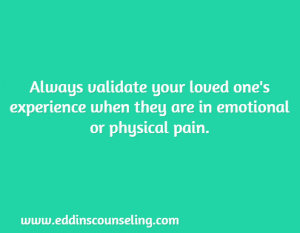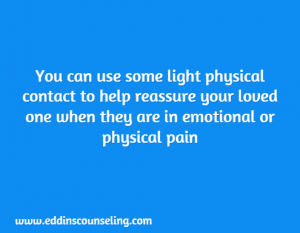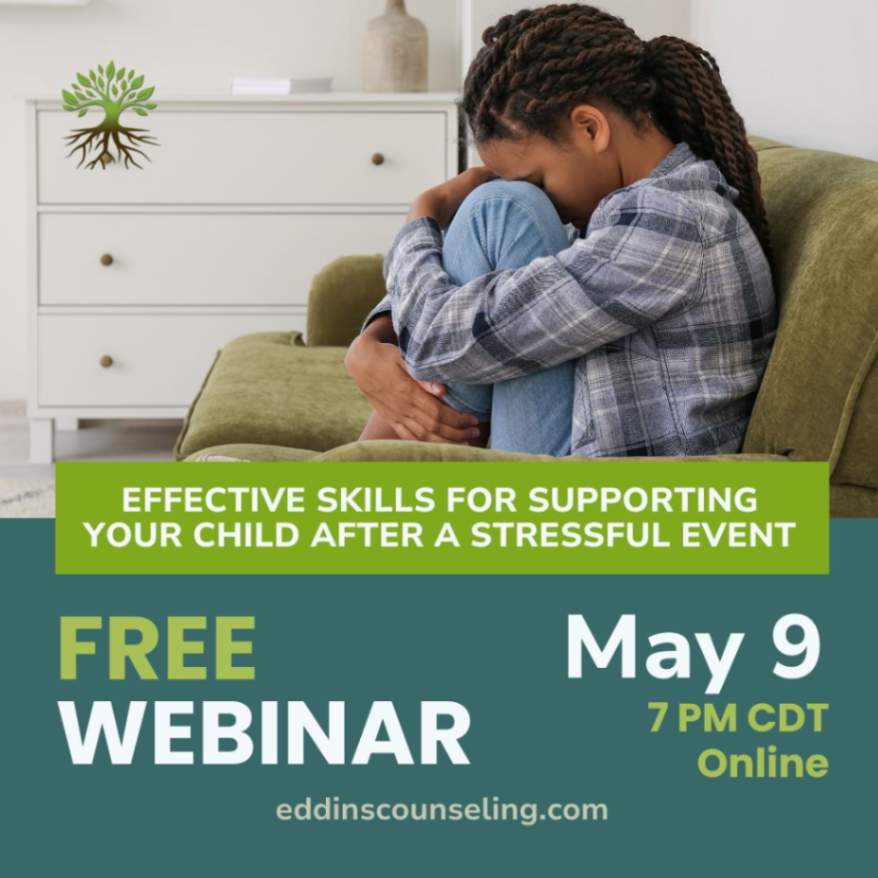March 2, 2016
What to Say When a Loved One Experiences Emotional or Physical Pain
Written by Rachel Eddins
Posted in Emotional & Mental Health, Relationships, Couples, Marriage and with tags: Communication, emotional health, self-compassion

You don’t want to see those that you love in pain, either physical or emotional. However, if this unfortunate situation should arise, you may find yourself wondering how to best approach them and offer your support.
How to Support a Loved One in Emotional Pain
1. First, just listen.
Understand the issue at hand. There may be more to it than you originally thought. If you go in with the intent to talk first, based on incomplete information, you may very well land in one of many “conversational mines.” There’s a chance that they want to tell you more, but are having trouble doing so. If that seems to be the case, just ask them gentle, open-ended questions to draw out the answers (avoid making it seem like an interrogation). An example of an open-ended question might be, “tell me more about that,” “what is that like for you,” “what else happened?” Don’t ask yes/no type questions (i.e., did you see the doctor?)
In a way, just by having them talk about the issues that plague them, you’ll already be helping. Sometimes when we’re suffering, talking about our problems with someone else can do wonders in getting our minds straight.
Read more tips on how to improve communication and “active listening” in your relationship.
2. Don’t try to “fix” it. Validate their experience instead.
There may be times when you don’t like what you hear. Do not tell them that they are wrong to feel the way they do, even if you’re well-meaning, such as, “that’s not true, people do like you,” or “you’re wrong,

Don’t try to “fix” it. Validate their experience instead.
you are pretty.” You may try saying, “I can see why you would feel that way” to keep the conversation going. If the conversation stops now, you may miss your chance to help your loved one in need.
Avoid the pitfall of trying to “fix their problem.” Often, we can feel uncomfortable with someone else’s pain and want to take it away for them. If you did x, y and z, maybe that would help? Did you get a second opinion? Unfortunately, this can make the other person not feel heard. No matter how uncomfortable those emotions are for you both, it’s important for you to remember that just showing interest and validating their feelings is a huge help.
Examples of validation include:
That makes sense to me.
I can see that you’re in a lot of pain right now.
I can see why you’re feeling so scared right now.
How hard that must be.
What a difficult situation to be in.
That must feel so frustrating for you.
I can see how that can make you feel really sad.
What a difficult place to be.
3. Ask them if there is anything that you can do to help.
Sometimes they will not have an idea of what you can do for them, but at least they will know that you are there for them, and willing to help the moment they figure it all out.
If they don’t have any specific requests on how you can help, offer soothing words of comfort. Examples include:
I’m sorry you’re going through this.
I’m here for you.
I love you.
I know this is a difficult time for you.
You are not alone.
I believe in you.
It’s okay to feel this way, it makes sense to me.
I can understand …
You can count on me.
4. Use some light physical contact to help reassure your loved one if that is comfortable for them.
Choose appropriate points in the conversation to give a hug, or

Physical contact is helpful when comforting others, but be careful not to take it to the extreme. You may overwhelm them if you overdo it.
lightly touch their shoulder or arm. Physical contact is helpful when comforting others, but be careful not to take it to the extreme. You may overwhelm them, if you overdo it.
If your loved one is in the hospital, and it seems like your visits are draining them of their energy, you may try offering to help with things at home. Offer to water their plants or to play with their dogs. You don’t have to be physically present with the person to help them.
If you and your loved one are religious, offering to pray with them can be comforting. However, if your loved one is not religious but you are, then just offer to pray for them, instead of with them. Most non-religious people know that this is a sign of support, even if they themselves do not believe the same as you do. Offering to pray with them, in these cases, may upset your loved one.
When you talk to them, try to remain at eye level. Keep it personal and refrain from “standing over” them. Make sure that they want to talk. While it’s okay to try to draw out some answers to start a conversation or keep it going, avoid forcing the issue. If someone is not ready to talk yet, pressuring them to do so may keep them from talking to you about it in the future.
If they are ready to talk, make sure to pay attention and make it clear that you are paying attention. Don’t remain completely silent. Throw in a few short comments that go over what you’ve talked about. This will make it clear that you are completely devoted to the conversation.
Be Gentle with Your Own Emotional Pain
If it’s hard for you to be with others’ emotional pain, it may also be difficult for you to be with your own emotional pain. Remember, that suffering is also part of being human and no matter how painful, it will pass. You will get through it or find a way to adapt to the new situation. If you are supporting someone who is going through a difficult time, it can also be draining for you and you may need support yourself. Give yourself permission to get the support you need. It can be worth it tremendously to learn how to cope more effectively with emotional pain.
Remember, that you can use these steps to help you cope with your own emotional or physical pain as well. Allow yourself to feel your feelings and get clear on all the feelings you have about the situation (journaling or processing with someone else can help). Provide validation for what you are feeling (internally validate yourself for what you are going through). Ask yourself what you need – what would be helpful for you? Offer yourself words of comfort and support. Give yourself physical support through touch – cupping your jaw with your hands, putting your hands on your heart or holding your arms as if you’re hugging yourself can all be impactful forms of touch. By doing this process, you’re practicing self-compassion.
For more help coping with emotional and physical pain, contact one of our counselors in Houston. Our therapists are available for face to face session as online therapy sessions in limited areas. To get started now give us a call to schedule an appointment at 832-559-2622 or schedule an appointment online.
Grounding & Self Soothing
Get instant access to your free ebook.
Why You Feel This Way
Get instant access to your free ebook.




























